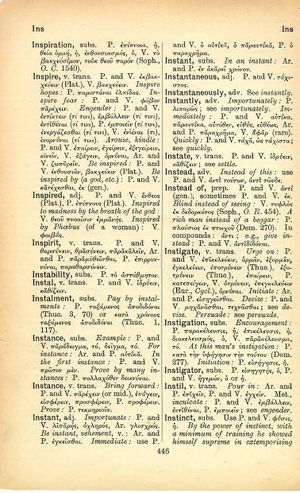instigator: Difference between revisions
From LSJ
ἀσκέειν, περὶ τὰ νουσήματα, δύο, ὠφελέειν, ἢ μὴ βλάπτειν → strive, with regard to diseases, for two things — to do good, or to do no harm | as to diseases, make a habit of two things — to help, or at least, to do no harm
(CSV4) |
(6_8) |
||
| Line 2: | Line 2: | ||
|Text=[[File:woodhouse_446.jpg|thumb|link={{filepath:woodhouse_446.jpg}}]]'''subs.''' | |Text=[[File:woodhouse_446.jpg|thumb|link={{filepath:woodhouse_446.jpg}}]]'''subs.''' | ||
P. [[εἰσηγητής]], ὁ, P. and V. [[ἡγεμών]], ὁ or ἡ. | P. [[εἰσηγητής]], ὁ, P. and V. [[ἡγεμών]], ὁ or ἡ. | ||
}} | |||
{{Lewis | |||
|lshtext=<b>instīgātor</b>: ōris, m. id.,<br /><b>I</b> a [[stimulator]], [[instigator]] ([[post]]-Aug.): sibi [[quisque]] dux et [[instigator]], Tac. H. 1, 38: [[superfluus]], Aus. Ep. 17 fin.: accusationis, Dig. 3, 2, 20. | |||
}} | }} | ||
Revision as of 08:34, 13 August 2017
English > Greek (Woodhouse)
subs.
P. εἰσηγητής, ὁ, P. and V. ἡγεμών, ὁ or ἡ.
Latin > English (Lewis & Short)
instīgātor: ōris, m. id.,
I a stimulator, instigator (post-Aug.): sibi quisque dux et instigator, Tac. H. 1, 38: superfluus, Aus. Ep. 17 fin.: accusationis, Dig. 3, 2, 20.

